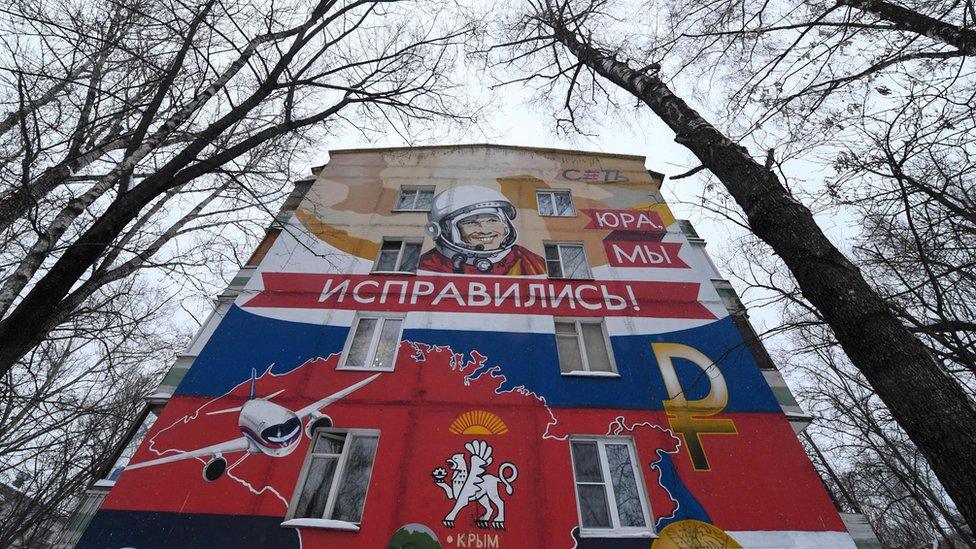Moscow draws up official rules for graffiti
- Published

Official street art favours "patriotic" topics such as the annexation of Crimea, and the Soviet space programme
Street artists in Moscow will have to follow new rules drawn up by the city government, including an approved set of subjects and a compliance process, it's reported.
Any graffiti should from now only deal, external with science, sport, art, historical events. and "depictions popularising outstanding personalities", according to the Kommersant newspaper.
No other topics are allowed in general, but the rules single out pornography, swearwords, depictions of tobacco, explosives and drugs as being out-of-bounds, as well as anything encouraging violence or cruelty.
Insulting people on the basis of their sex, race, nationality, and even their profession is also prohibited - a measure possibly aimed at discouraging criticism of politicians or the police.
The regulations also set out an intricate bureaucratic procedure for getting your artwork approved.
First, any project needs to be submitted to the city's housing department, which then confers on the details with six other authorities.

Celebration of Russia's military strength is also encouraged
Once the final design is approved by a board of inspectors from all seven departments, it's good to go - provided the artist gets to work between 1 April and 1 November, as working in the long winter months is banned.
The document applies to all "writing or images created through painting, stickers, or drawing in the 'graffiti' technique" on Moscow buildings, according to Kommersant.
'Poor Banksy'
The streets of the Russian capital are full of huge murals, apparently created under the aegis of the city government and supportive of President Vladimir Putin.
Mayor Sergei Sobyanin is a key loyalist of the Kremlin, which has been pushing a strongly nationalist line in recent years.
Often reminiscent of Soviet propaganda murals, external, modern street art in Russia reflects topics favoured by the authorities, mainly those fostering national pride, including in the Soviet past.
But spontaneous work mocking the authorities is quickly removed, such as recent graffiti on a bus stop, external in the city of Kamensk-Uralsk depicting Mr Putin as the King of Spades.
You may also be interested in:
Even Russia's officially-recognised street artists wonder whether the new rules may be going overboard.
Ivan Panteleyev - an organiser of street art festivals in Moscow - tells Kommersant that he understands the desire to regulate the "industry", but believes the rules "throw out the baby with the bath water" and will stifle graffiti with bureaucracy.
And as for online, the very idea of regulating street art prompts hilarity. "Graffiti by industry standard," quips one commenter on the TJournal community.
Another - referring to the well-known anonymous British street artist - says simply: "Poor Banksy"
Reporting by Adam Robinson
Next story: Uzbeks protest at house demolitions
Use #NewsfromElsewhere to stay up-to-date with our reports via Twitter, external.